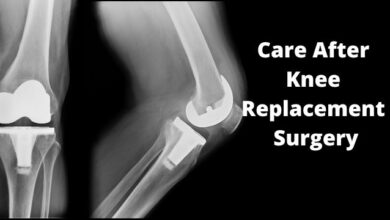Care After Knee Replacement Surgery
Post-Knee Replacement Surgery: Essential Care Guidelines

Without the assistance of friends and family, care after knee replacement surgery can be difficult.
The first few days at home are frequently the most challenging. The individual you’re taking care of is probably worn out and in discomfort. Because it’s challenging for them to move around and take care of things on their own, they could be angry or afraid.
You are most need right now. As you adjust to your new position, it’s crucial to be patient with your loved one. Here are ten steps you may do to ease this shift.
Care After Knee Replacement Surgery
Start With The Basics
A smooth recuperation can be ensured by preparing the home beforehand. On the first floor, you could want to build up a rehabilitation area. Everything you might need should be in this room, including:
- Using cushions to raise the lower leg
- If the bathroom is inaccessible, a bedside toilet or urinal is provided
- Ice packs for the knee
- A bed that isn’t too high or low off the ground
- A phone or smartphone with a charger
- Medications that are easily accessible, recognizable, and organized.
- A walker or crutches a notebook and pen for taking notes or making a list of questions for the medical staff.
- Cosy pyjamas, cosy shoes that are safe for going about the house bandages for changing dressings
- Easy-to-use controls for lights or lamps
- Toiletries, clean, dry linens
Stock up on food and make sure all necessary supplies are nearby. Items on the floor that can cause a fall should be removed.
For the person you’re caring for, standing, sitting, and moving between rooms may be challenging. You might need to assist them with everyday duties and mobility. This could entail helping with meal preparation or personal hygiene.
Help With Medications And Wound Care
It’s crucial that the patient takes all drugs exactly as recommended by their medical staff. You might need to assist in gathering the drugs, ensuring that they are taken as directed, and keeping track of and renewing pharmacy prescriptions.
Utilizing a daily drug dispenser can be beneficial for you. You may buy these online or at your neighbourhood pharmacy.
Before beginning outpatient care, if at all possible, consult with the patient’s physician. They can discuss the prescriptions they require and address any queries you may have.
Additionally, keep an eye out for swelling and inflammation around the area. This can entail changing bandages and getting any necessary medical supplies, like bandages.
Seek medical attention if the wound is growing larger, more swollen, starting to drain, or emitting an odor. Before and after handling bandages, thoroughly wash your hands.
Make an effort to create a schedule where you administer medication and perform wound inspections at the same times every day.
Take On Household Chores
The person you’re caring for will probably not be able to do anything that requires prolonged standing, stretching, or bending for the following few weeks.
They could struggle to travel from room to room when carrying out home duties, cooking meals, or doing other activities.
They might be able to perform simple tasks like dusting, but they won’t be able to perform any thorough cleaning. Vacuuming and doing laundry are often off limits as a result. Consider taking on some of these tasks yourself or hiring outside assistance.
For a while, you might also be required to help with food preparation and grocery buying. During the initial weeks of rehabilitation, consider freezing meals in advance and requesting meal deliveries from friends or family.
Following surgery, it’s critical that your loved one consumes wholesome foods, takes their prescriptions, and gets enough of rest.
Help With Medical Appointments
Maintaining a calendar might help you keep track of the person’s daily requirements and appointments.
It’s critical to keep track of their follow-up appointments and make appropriate plans because skipping an appointment could result in setbacks or other issues. Transportation is included in this.
For the first 4 to 6 weeks after surgery, the person you’re caring for most likely won’t be able to drive. They will therefore require transportation to their appointments.
Do not be afraid to contact the medical staff if any problems occur in between consultations.
This might involve inquiries into:
- Prescription drugs or unexpected effects on them
- Growing agony as temperature rises
- Chest pain or shortness of breath episodes brought on by edema or drainage from the incision
Provide Motivation For Rehab And Exercises
It’s crucial to follow a recovery strategy. This typically entails 30 minutes of daily walking for many people. Additionally, doctors can advise doing an additional 20 to 30 minutes of exercise twice or three times daily.
The person might have pain when walking or exercising. That is typical. Remind them that what they’re feeling is normal and that continuing with their rehabilitation programme will hasten their recovery if they indicate a wish to stop.
They might be more motivated if you help them track their efforts, outcomes, and development. Walking and exercising alongside them could assist in keeping them on course.
Keep A List Of Questions For Medical Professionals
After knee surgery care and during recovery, it’s typical to have questions. Use a note-taking tool or go old-school and use a pen and paper so you can write down inquiries as they come up.
You could discover that you have concerns of your own about how to offer after knee surgery care. You’ll be more likely to remember to bring up your queries and worries with the care team if you write them down.
Read Also: How To Get A Stronger Core? 11 Exercises For Stronger Core
Watch For Changes
The individual you’re taking after knee surgery care of is probably totally committed to healing. An outside viewpoint could be extremely useful in this situation after knee replacement care.
It’s crucial to get in touch with a medical expert if you observe any noticeable changes in their physical or mental health.
Any post-operative issues, changes to the wound, or drug adverse effects may require prompt attention from the medical staff.
Keep Up With Paperwork
After knee replacement care is a difficult treatment that calls for numerous expert services. As a result, over the course of several weeks, a deluge of bills and reports will arrive from various suppliers and locations.
It may already be difficult to deal with the physical recuperation process. Anxiety can increase if you fall behind on your bills and paperwork.
If you can, take the initiative on any alerts from after knee surgery care team that require action. The individual you are caring for can concentrate on healing if the paperwork is kept up to date.
Use an accordion folder or a large binder with tabs for each category of correspondence to keep paperwork organized after care for knee replacement.
Provide Emotional Support
Even though having a knee replacement is physically demanding, healing and rehab also require a lot of mental strength.
The person you’re caring for can be impatient or frustrated by the discomfort or what they perceive to be a lack of progress. Their attitude and sense of worth may be affected by their movement. Depression following surgery is a possibility for some people.
You may help your friend or family member recover more quickly, stay on track, and put in the work necessary for a successful recovery by giving them continual support and encouragement.
Sometimes people will vent their anger on the caregiver at the time of Knee operation after care. Hurt feelings can be avoided by having open and honest conversation, attempting to convey your feelings without assigning blame, and listening to one another.
Take Care Of Yourself
If you aren’t taking the time to look after yourself, it may be challenging to look after someone else. Be sure to take pauses and engage in enjoyable activities, such as engaging in hobbies, seeing friends, or setting aside time for solitude.
To reduce stress, try taking regular walks, reading a book, or meditating. Don’t be reluctant to approach other friends or family members for help, especially if you feel overworked or overloaded.
Conclusion
You may successfully care after total knee replacement surgery with the right planning.
At first, the person you’re caring for will probably require daily support from you or another person, but after a few weeks, they will require less and less help. They may need up to 3 months to resume their regular activities, and it may take them 6 months to regain their knee’s normal strength.
It can be difficult to provide for another person. Don’t be afraid to ask for assistance, and make sure you schedule time for self-care if you want to adequately care for both you and them.
Disclaimer
Articles with medical material must be used solely for the purpose of providing general information. Such materials should not be used for (self-) diagnosis or treatment of specific illnesses or medical conditions. They cannot, for example, replace a licensed physician’s or pharmacist’s examination, advice, or treatment. The articles will not be used to respond to any specific questions.
FAQ
Q- How long does it take after a knee replacement to walk normally?
A- Fortunately, within 24 hours of surgery, you can start using a walker, cane, or crutches to help you walk. Within two to three days of surgery, patients are sent home if everything goes well. Physical therapy can be carried out at home or in an outpatient facility. It will take about 8 weeks to recover completely.
Q- What activities are prohibited following a knee replacement?
A- Avoid stools, couches, soft chairs, rocking chairs, and chairs that are excessively low after your surgery. When rising from a chair, glide toward the edge and support yourself on the chair’s arms, your walker, or your crutches.
Q- How long does a total knee replacement cause pain?
A- Don’t give up if you experience knee pain after surgery; it may continue anywhere from six months to a year. The long-term benefits of knee replacement surgery include pain alleviation and better function.
Q- What is the issue that people after knee replacement surgery most frequently report?
A- A stiff knee. Stiff knee joints are among the most frequent issues people encounter following knee replacement. These symptoms frequently make it difficult to perform everyday tasks like sitting in a chair, getting out of a car, or going down stairs.
Q- What position does a knee replacement patient sleep in the best?
A- Sleeping on your back is recommended for the first few nights following surgery. To prevent knee hypertension and maintain appropriate blood flow to the surgical site, you should keep your operated leg as straight as you can. Put the pillow under your leg and knee if you’re sleeping on your back.
Related Queries
- After Knee surgery care,
- knee surgery after care,
- after knee replacement care,
- after care for knee replacement,
- knee operation after care,
- care after total knee replacement



